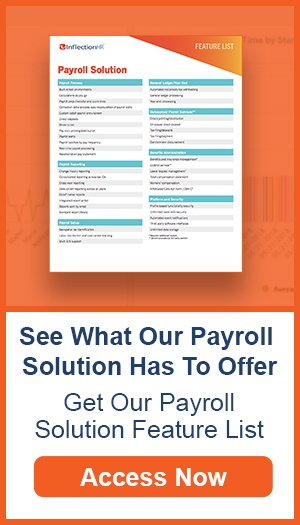As your company grows, you may decide that it is time to outsource payroll in order to save time. The fact is that doing payroll in-house is not only tedious for your staff, but it can be a waste of resources that could better be used to expand your business. While outsourcing your company's payroll can prove extremely beneficial, you may find yourself overwhelmed when trying to choose a payroll provider to partner with. How can you ensure that you choose a payroll company that meets your business's needs? Whether you are considering outsourcing payroll for the first time, or you are considering switching payroll providers, here is a look at eight questions you should ask prospective providers before making a final decision.
What Payroll Services Do You Offer?
Outsourced payroll providers offer a wide range of services that go beyond basic check processing and even tax services. To help you determine which provider will best meet your company's needs, it is important that you first decide in advance what payroll services your company needs help with, and ask potential payroll providers what services they offer. The fact is that each payroll provider offers different levels of service, and pinpointing your specific needs can be extremely helpful in narrowing down your options. Whether you need your payroll service to track paid time off (PTO) accrual/use or deduct benefits such as health insurance and 401(k) contributions, you can find a payroll provider that provides the right services to meet your company's needs.
Does Your Company Handle Tax Returns and Tax Deposits?
One of the most important things you should consider when deciding what services your need most from your ideal payroll provider is whether you need help when it comes to your tax obligations. Not all payroll providers are the same, and only certain companies will help file tax returns and make tax deposits on your behalf. Partnering with a payroll service that handles all of your payroll tax compliance needs, including handling federal and state income taxes as well as unemployment taxes and state unemployment insurance, can take a great burden off of your hands. Some vendors can even process your year-end 1099 and W-2 forms for your employees. Partnering with a payroll provider that takes care of all of your tax compliance requirements automatically without any action required on your end can make things significantly easier for you.
What Kind of Support Do You Offer?
While a cloud-based payroll solution should be simple to use and pain-free, it is inevitable that you will have to speak with customer support at some point if you encounter a problem. It is then important that you find out what kind of support services a prospective payroll provider offers in order to ensure that you will be able to receive quality customer service when you need it most.
Business owners should be able to receive customer support services that are aligned with their business needs, meaning they should be able to easily get in touch with a real person via email, phone, and chat. You don't want to be stuck waiting days to get the support you need. Ideally, you should also have a dedicated support person assigned to your account, as working with the same person every time who is familiar with your business will allow them to more efficiently handle any problems that you may encounter.
Is Training Needed or Offered?
When talking to prospective payroll providers about their services, it is important that you find out what implementation would look like and whether or not training is provided. The fact is that outsourcing payroll represents a major conversion for your business, and it will take time for everyone to adjust to the new system. However, in order to ensure that this transition goes as smoothly as possible, it is important that your provider does the heavy lifting.
Your payroll provider should not only provide training to ensure that your staff knows how to use the new system, but they should also ideally convert historical employee data into the system, and they should make sure that everyone knows how to log into their account and make changes. A good payroll provider will be hands-on with implementation and ensure that this transition goes as smoothly as possible.
What Will Your Company Handle, and What Will My Company Still Be Responsible For?
Depending on the level of service offered by the payroll provider you choose, you may still have certain responsibilities your company will handle in-house such as making sure that all time cards are in on time, and you may still have certain compliance responsibilities come tax season. It is then critical that you find out what a prospective payroll provider handles, and what your company will still be responsible for so that you know what to expect moving forward. It is particularly important that you find out what your tax obligations are so that you don't end up with heavy fines from the IRS for being out of compliance.
What Type of Security Does Your Company Use to Protect Our Information?
When handling payroll, dealing with private personal information (such as bank account information and social security numbers) is an inherent part of the process. It is then critical that you find out what kind of security measures a payroll provider has in place to protect your company's sensitive information, as a security breach can put your business at risk. Your payroll provider should use a combination of methods to protect your data including encryption methods, firewalls, multi-factor authentication, and backup practices. Any payroll provider you are considering working with should be able to demonstrate to you specific steps that their company takes to protect your data.
Are You Familiar With Our Industry and The States We Operate In?
The fact is that every industry has unique intracicies, making it important that you partner with a payroll provider who has ample experience working with companies in your industry. They should know the unique challenges faced by companies like yours and what compliance issues are applicable to your business. It is equally important that you make sure that a prospective payroll provider has worked with companies in the states where you do business, as each state has unique wage laws, benefit laws, and HR regulations that can affect how payroll is handled.
What is The Cost For Your Services, and What is Your Pricing Structure?
Of course, a major deciding factor when choosing a payroll provider to partner with is how much their services cost. It is then important that you get a clear answer on how much a provider charges for their services, how their pricing structure works, and what is included in the price you will be paying. Knowing how their fee structure works and how their services are charged can not only help you compare providers to ensure that you are getting a good deal, but it will also ensure that you do not encounter any surprising fees or charges down the road.
Taking the time to find a payroll provider that will be a good fit for your company can help your business run more efficiently. Feel free to contact us to learn about additional questions that you should ask, and things you should consider, when choosing a payroll provider.




